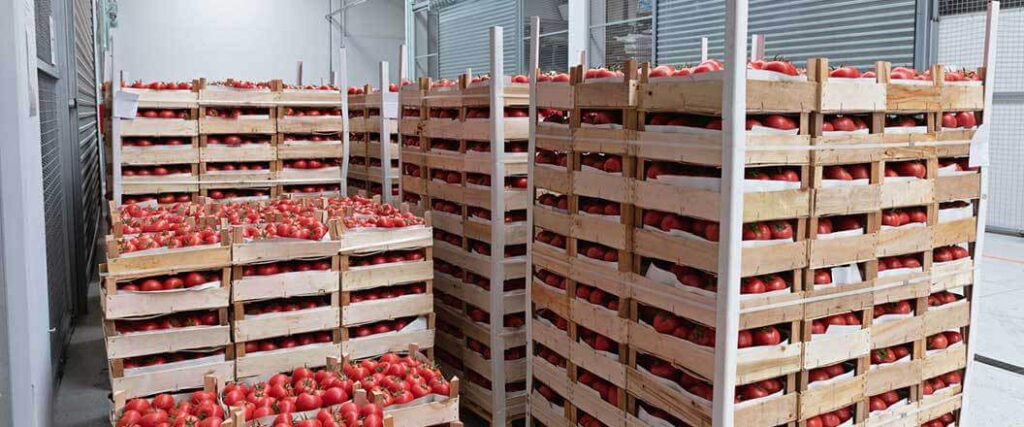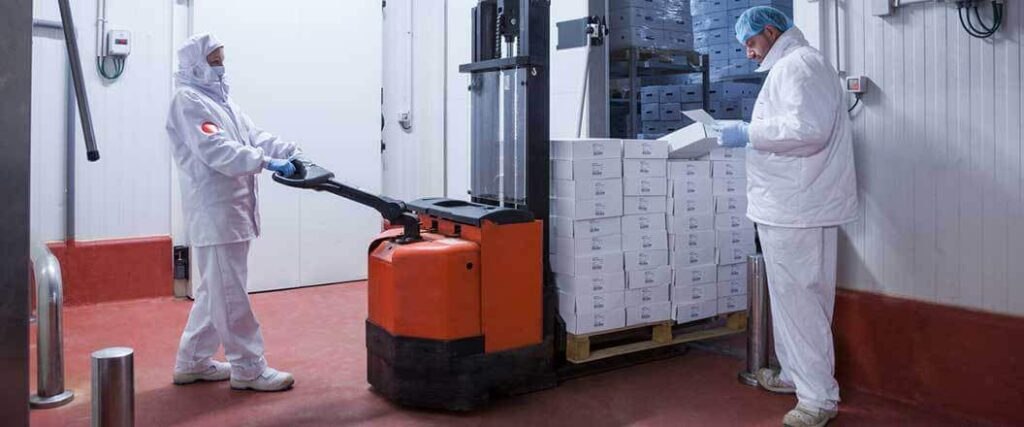There are various types of refrigerated freight. Despite the differences between each, these products are extremely difficult to transport. Many refrigerated goods can expire and are extremely fragile. Therefore, transportation of these products come with many risks that shippers and carriers have to prepare for.
As outlined by the International Refrigerated Transportation Association, the main types of refrigerated freight include:
Each product must be transported at a specific temperature and within a certain period of time before spoiling can occur.
Shippers should understand the conditions their type of refrigerated freight should be kept in before hiring a carrier.

The different types of refrigerated cargo can span a wide variety of goods. We’ve already outlined the top four classes of refrigerated goods. Read up on each type to learn about the unique temperature treatment needed during transport.
Perishable foods are the most common type of cold products. These items must be kept in a variety of climates based on the characteristics of each. We’ve included some data that shows the temperature ranges that different kinds of perishable food be kept at.
| Perishable Food | Temperature |
| Fruits and Vegetables | 32℉ – 55℉ |
| Dairy Products | 36℉ – 39 ℉ |
| Seafood | 30℉ – 34℉ |
| Meat | 36℉ – 39℉ |
Provided by The University of Maine and BC Campus
The priority for refrigerated transport companies is to maintain the quality and safety of food. To do this, trucking companies follow regulations outlined by the Food and Drug Administration (FDA) to ensure these products arrive in acceptable condition.
It's also worth noting that the packaging plays a crucial role. The use of insulated materials can help maintain the right temperature and protect the goods during transit.
Learn about produce shipping costs to discover how much you’ll spend on this transportation option.
There are many kinds of prescription items that require temperature controlled transport. Pharmaceuticals can become unstable when exposed to extremely hot or cold places. Therefore, certain drugs have to be kept at very exact temperatures. We’ve provided additional data on the types of pharmaceutical items and the corresponding climate for each.
| Pharmaceutical Type | Temperature |
| Room Temp | 59℉-77℉ |
| Refrigerated | 36℉-46℉ |
| Frozen | 5℉ or Lower |
Provided by GMP Compliance and American and Biotech Supply
It’s essential that these goods are kept at the corresponding temperatures. If not, they can lose their effectiveness. To help ensure drugs are kept in the correct climate, shippers can use gel packs or similar options to keep them cold.
Plants and flowers are another type of refrigerated cargo that must be handled with care. Each of these organisms have different temperature requirements. It all depends on the type of environment the plant or flower originates.
Shippers should know what temperatures their goods need to be kept at prior to handing them over to a carrier. Fortunately, we have some data that can help.
| Plant or Flower | Recommended Temperature |
| Flower | 33℉-35℉ |
| Tropical Flower | 50℉-55℉ |
| Cold-Tolerant Plant | 45℉-50℉ |
| Cold Sensitive Plant | 55℉-60℉ |
Provided by American Floral Endowment and Michigan State University
Remember, maintaining the right humidity level is also important when transporting plants and flowers, as dry or damp conditions can harm them. These organisms should also be watered well before shipping, but not overwatered. An excess amount can cause fungal growth.
Medicines and vaccines can lose their effectiveness if not stored within the proper climate range. The chemical or biological reactions that make them work can be altered or even halted if temperatures are too high or low.
Additionally, some medicines can break down into compounds that may be harmful if they’re not stored properly. Medicines and vaccines can be separated into two different temperature categories.
This includes:
These temperature ranges are drastically different from one another. Fortunately, healthcare cold chain logistics help keep these goods protected. We have some data that shows the corresponding climate these types of medicines and vaccines should be kept in.
| Medicine and Vaccine Type | Temperature |
| Refrigerated | 31℉-46℉ |
| Frozen | -58℉-5℉ |
When medicines and vaccines are transported, shipping companies use data loggers or temperature monitoring devices to ensure the climate stays within these ranges. Doing so will ensure these items can be used after arriving at the final destination.
Cold chain vaccine transportation is the shipping option to use when moving these valuable goods.
Refrigerated freight is transported in specially designed vehicles and equipment outfitted with cooling systems. This technology maintains the temperature and humidity levels necessary for climate controlled cargo to make it to the final destination without spoiling.
The vehicles and equipment used for transporting refrigerated cargo include:
Depending on the type of goods and the distance, different forms of refrigerated transportation may be used. Typically, freezer vans are used for shorter distances and when shippers have only a small quantity of products to send.
A reefer container is used for international ocean transport. This large metal box can fit a huge quantity of refrigerated cargo. Reefer trailers are a common option used for ground transport. This type of equipment can carry bulk loads of perishable items.
Refrigerated boxcars are also used for moving sensitive products overland. Instead of traveling on a road, however, this kind of equipment is pulled along a rail line. Shippers use this option when they have large quantities of freight to move over extremely far distances.

The primary difference between refrigerated freight shipping and other options is temperature control. Regular transport methods don't provide a regulated climate for the products being transported. Therefore, freight is subject to the temperatures inside the trailer, boxcar, or van it’s being shipped it. Reefer truck transport provides the climate control that dry vans can’t achieve.
Additionally, refrigerated product shipping often involves stricter regulations and standards to ensure the safety and quality of the goods being transported. This is to ensure the perishable products are safe for use after arriving at the final destination. Most products that aren’t temperature controlled won’t be subject to as many regulations.
At USA Refrigerated Freight, we're not just experts in freight transportation. We're specialists in temperature-controlled shipping. We understand the unique needs of various types of perishable freight, and we tailor our services accordingly. That’s why we provide a variety of temperature controlled transportation options.
These include:
We guarantee that your shipment of perishable goods will be safe and arrive on time. If you’re ready to experience refrigerated shipping services, then fill out your quote today. You can also give as call at (866) 849-2713 if you have any questions or concerns.
USA Refrigerated Freight
315 NE 14th Street #4122
Ocala, FL 34470